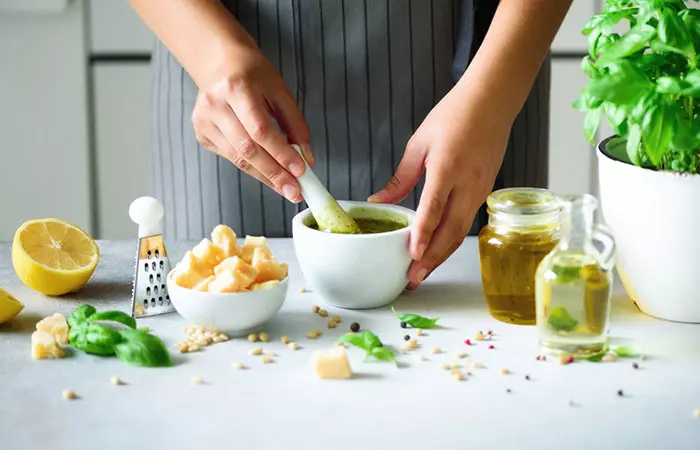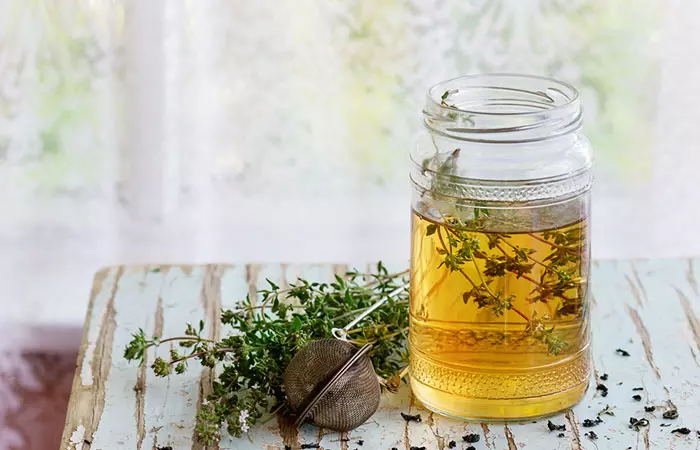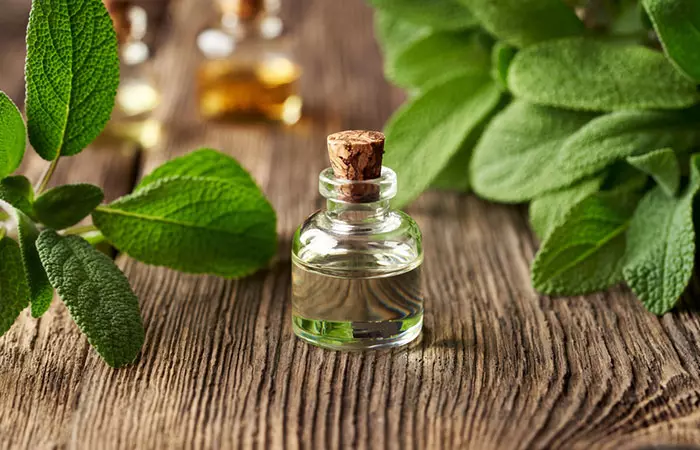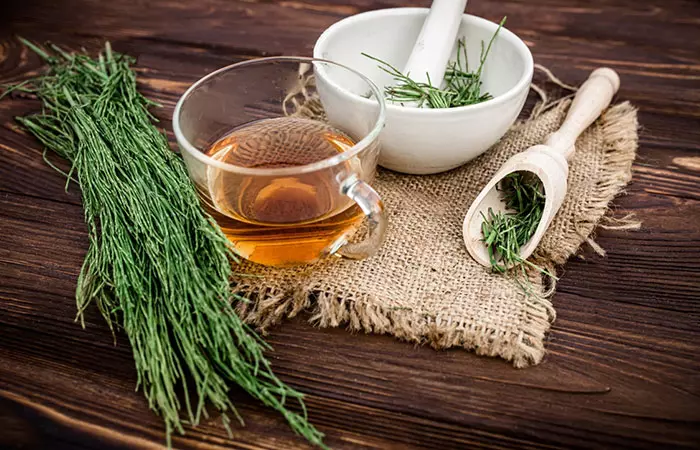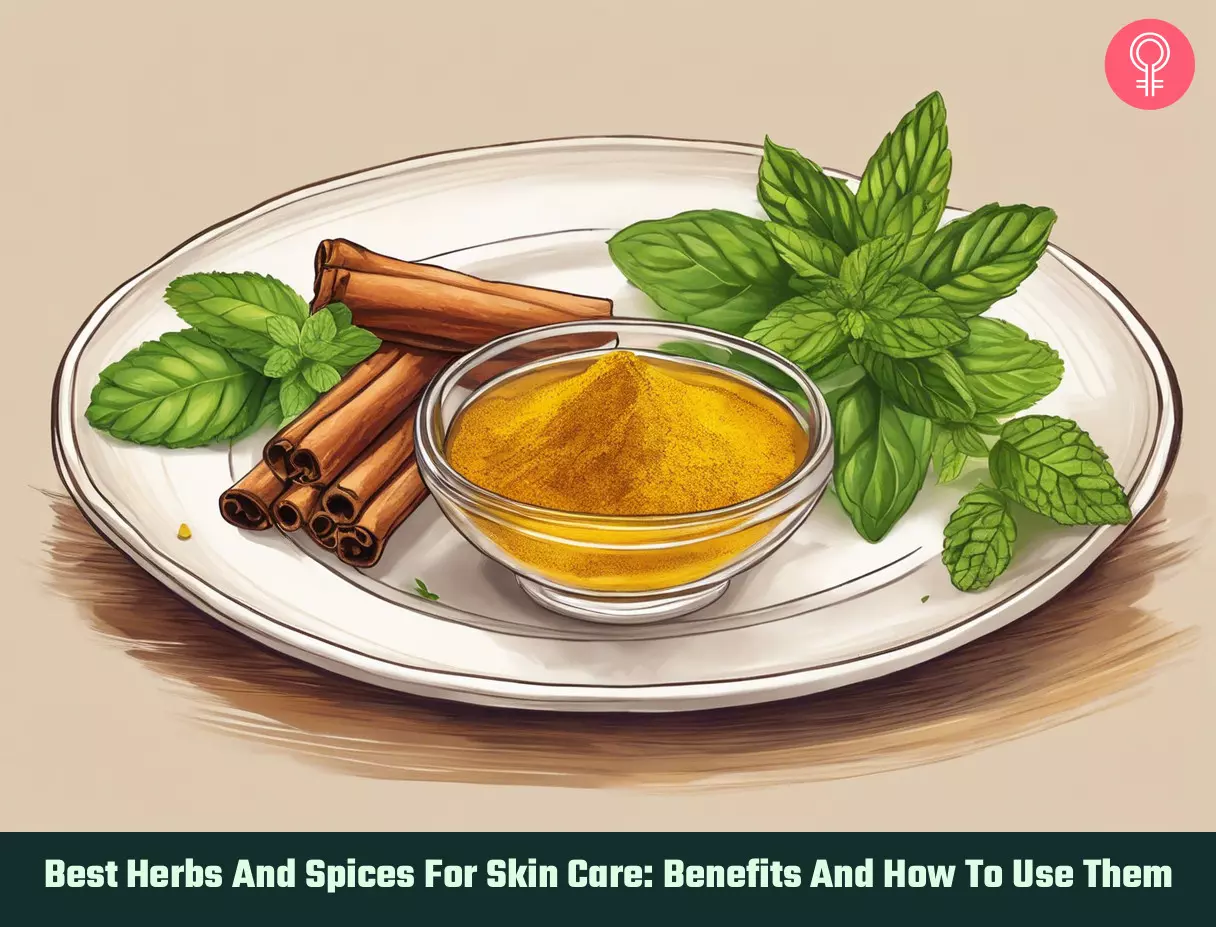In addition, these natural remedies are cost-effective and have fewer side effects compared to chemical-filled products. If you are keen to give them a try, we have curated a list of the best healing herbs and therapeutic spices that may boost your skin health and ways to use them. Keep reading.
21 Best Herbs And Spices For Your Natural Skin Care Regimen
Discover the power of nature with these 21 herbs and spices for your skin care routine. They are packed with antioxidants and healing properties and can make your skin healthy and radiant.
1. Aloe Vera
Aloe vera contains vitamins and minerals that are good for the skin. It has been a part of Ayurvedic skincare remedies for ages. It may help produce collagen and elastin fibers that make the skin more elastic and prevent wrinkles (1). It may also treat pigmentation and speed up wound healing by improving blood circulation and preventing cell death around the wound (2). What You Need
2-3 aloe vera leaves
How To Use A YouTube vlogger tried aloe vera on her skin and shared her experience in a video. She said, “I must say the tan has kind of faded away, the marks have faded away very little but it has done a lot better to my skin because the dryness which I had before is not that much right now. It is kind of okay, so if you ask me am I going to continue this? Probably a big yes (i)”.
2. Turmeric
Turmeric has powerful anti-inflammatory properties that treat skin irritation, insect bites, and wounds. It is one of the prominent ingredients used in many home remedies to rejuvenate the skin. Studies show that it may help control inflammatory and infectious disorders of the skin (3). This herbal medicine may also help treat psoriasisi An immune-mediated skin disease that causes scales and itchy, scaly patches and skin inflammation. and atopici A long-term allergic, inflammatory condition characterized by itchy, red, swollen, and cracked skin. and iatrogenic dermatitis. What You Need
2 teaspoons milk 1 teaspoon turmeric powder
How To Use
3. Mint
Mint soothes and refreshes itchy skin. Its strong antibacterial and antioxidant properties may help solve skin problems. It also contains salicylic acid that helps clear clogged follicles. This results in reduced acne and blackheads (4). A study also suggests that the antioxidant activities of mint may help reduce oxidative stress and hyperpigmentation (5). Those looking for herbal beauty tips for glowing skin can incorporate mint leaves or even its essential oil to keep the skin healthy. What You Need
10-15 mint leaves 2 tablespoons water
How To Use
4. Green Tea
The benefits of green tea are not restricted to weight loss alone. It may also reduce the risk of skin cancer and reactivate dying skin cells (6). Besides, green tea extracts are claimed to protect the skin from UV-induced damage and treat skin disorders like psoriasisi An immune-mediated skin disease that causes scales and itchy, scaly patches and skin inflammation. . However, there is not enough scientific evidence to prove the same. What You Need
1 tablespoon steeped green tea 1 tablespoon baking soda 1 teaspoon honey
How To Use
5. Chamomile
Chamomile has traditionally been used to treat skin irritation, eczema, sunburn, sores, bruises, wounds, and even ear and eye inflammation (7). It is widely used in organic skincare products for its soothing and softening effect. It is also considered one of the most effective herbs for acne as it may help reduce inflammation. However, more research is needed to prove these benefits of chamomile. What You Need
One cup brewed chamomile tea ½ cup oatmeal 1 tablespoon honey
How To Use
6. Cinnamon
The high cinnamaldehyde content in cinnamon may promote collagen production. Thus, cinnamon extracts may help reduce the appearance of aging signs by reviving the stagnant collagen synthesis (8). The antioxidant properties of cinnamon may also help protect the skin from free radicals (9). It can also help treat mild to moderate facial acne (10). What You Need
1 tablespoon cinnamon powder 3 tablespoons honey
How To Use
7. Neem
The antibacterial and antifungal properties of neem may aid in treating inflammation, infections, and other skin issues (11). Studies suggest that neem is an effective herb that may boost collagen and elastin production. It is also shown to reduce the signs of aging like wrinkles, water loss, thickening, and skin rashes (12). What You Need
8-10 neem leaves 1 teaspoon turmeric powder
How To Use
8. Thyme
The phenolic compounds in thyme make it a powerful antiseptic. It can replace your toner and may fight against infectious bacteria on the skin. Its antibacterial and antifungal benefits may help treat pain, rashes, wounds, acne, and sores (13). What You Need
2-3 thyme stems 1 bowl of water
How To Use
9. Basil
Basil’s unique combination of antibacterial, antioxidant, anti-inflammatory and analgesic activities helps in treating skin diseases, infections, and acne. It also accelerates wound healing (14). What You Need
10-15 basil leaves 1 teaspoon rosewater
How To Use
10. Calendula
Calendula boosts skin hydration and firmness (15). A study shows that ointments and creams that contain calendula are more effective in healing wounds and other skin irritants (2). The anti-inflammatory properties of this flower accelerate wound healing, and the sulfur derivatives in it help dry out acne (16). What You Need
10-15 calendula petals 100 ml olive or almond oil
How To Use
11. Lavender
The topical application of lavender oil stimulates collagen production and improves wound healing. It accelerates the formation of wound-healing tissues and the contraction of a wound (17). Its anti-inflammatory properties may also help manage the inflammation caused by psoriasisi An immune-mediated skin disease that causes scales and itchy, scaly patches and skin inflammation. effectively (18). What You Need
Brewed lavender tea ¼ cup of alcohol-free witch hazel 2 drops of vitamin E oil
How To Use
12. Sage
Sage contains antioxidants that fight aging signs and free radicals. It can also reduce UV-induced wrinkles (19). It is also a natural astringent for oily and acne-prone skin. What You Need
1 cup green tea 1 teaspoon jojoba oil 2 teaspoons sage oil
How To Use
13. Witch Hazel
Witch hazel’s anti-inflammatory properties help in soothing sensitive skin and slow down skin aging (20). The antioxidant and astringent nature of witch hazel help in treating acne, psoriasisi An immune-mediated skin disease that causes scales and itchy, scaly patches and skin inflammation. , eczema, ingrown nails, cracked or blistered skin, and insect bites. It is also useful as an aftershave (21). What You Need
¼ cup of witch hazel ½ teaspoon of vitamin C powder 6 drops of lavender essential oil
How To Use
14. Oat Straw
Oat straw contains polysaccharides and silicon dioxide in soluble form that help regulate various skin processes. It helps treat inflammatory and seborrheic skin conditions, especially those that cause itching (22). What You Need
500g oat straw 2 liters of water
How To Use
15. Red Clover
A study conducted on rats has found that red clover stimulates collagen production and reduces skin aging (23). However, research on humans is required to prove the same. It is also said to promote the healing process of the skin, sores, burns, and ulcers with its antispasmodici A drug or agent used to relieve or suppress muscle spasms (painful contractions or tightening of muscles). and expectorant effects (24). What You Need
Red clover tea 3-4 drops of any essential oil
How To Use
16. Horsetail
A mixture containing horsetail along with various other plants and seeds was found to inhibit elastase enzymes that break down elastin and collagen. Its silicon content may also reduce the signs of aging like wrinkles and loss of skin elasticity (25). Studies have also shown that the topical application of an ointment with horsetail promotes wound healing and helps relieve pain (26). What You Need
1 cup of water 2 teaspoons dried horsetail ¾ cup of almond oil 2 tablespoons shaved beeswax
How To Use
17. Alfalfa
Alfalfa extracts have antioxidant and antibacterial properties. This herb may prevent photoaging and oxidative stress related to skin diseases (27). Alfalfa contains genistein that helps accelerate skin repair (28). Therefore, you can use alfalfa extracts to repair skin and reduce the appearance of aging signs. What You Need
2-3 alfalfa stems 1 bowl of water
How To Use
18. Chickweed
Chickweed helps boost wound healing. Its emollient properties soothe the skin affected by itching and irritation (29). It can also be used as an antirheumatic, anti-inflammatory, astringent, antipruritici A medication used to treat a variety of skin conditions, like allergies or rashes, and to relieve itching. , and emollient agent. The whole plant can be applied as a plaster on swollen areas due to its anti-inflammatory properties (30). What You Need
8-10 chickweed leaves 1-2 teaspoon rosewater
How To Use
19. Rosemary
Rosemary contains caffeic and rosmarinic acids that have antioxidant effects. These help prevent the signs of aging caused by the UV rays of the sun. Its antibacterial property is also effective against acne (2). What You Need
3 tablespoons oats 1 teaspoon freshly ground rosemary 1 teaspoon honey or water
How To Use
20. Dandelion
Dandelion may protect the skin from sun damage and photoaging (31). Its extracts may also reduce acne, and treat warts, eczema, and other skin conditions (32). What You Need
3-4 dandelion roots 5-6 calendula flowers (if needed)
How To Use
21. Oregano
Oregano oil is recognized for its antiseptic attributes. You can apply creams, ointments, and lotions infused with oregano oil to alleviate skin infections and inflammation (33). It contains carvacrol, an active compound that also aids in the restoration and regeneration of injured tissues. It helps inhibit several inflammatory biomarkers in the body (34). This property of oregano oil makes it a potential solution for reducing several inflammatory skin conditions such as acne. What You Need
1-2 drops of oregano essential oil 1 tablespoon of carrier oil (e.g., coconut, olive, or jojoba)
How To Use Wondering if these herbs and spices cause any harmful effects on your skin? Well, the answer mainly depends on your skin condition. If you have sensitive skin, do a patch test on your forearm before incorporating these herbs into your skincare routine. Consult a healthcare professional for infections and chronic issues that require immediate attention. To get the best benefits of the herbs, it is essential to find the best quality ingredients. Let’s understand how.
How To Choose Quality Herbs And Spices For Skin Care
Here are some tips you can keep in mind when choosing herbs and spices for your skincare!
Choose certified organic, non-GMO herbs and spices that were cultivated without harmful pesticides and chemicals that could irritate your skin. Look for vibrant colors and strong aromas, as these are indicators of freshness and potency. Buy from reputable suppliers that provide information on the origin and sourcing methods of their herbs and spices. Select whole or minimally processed herbs and spices as they retain more of their natural active compounds. Ensure herbs and spices are stored in airtight, dark containers to protect them from light, air, and moisture, which can degrade their quality.
How can herbs and spices be added to daily skincare routine? Herbs and spices can be infused into face oils, added to facial masks, and scrubs, or used in toners for daily skincare. What herbs tighten the skin? Turmeric, Porphyra red algae, comfrey, aloe vera, and witch hazel are some herbs that help tighten skin. These herbs are commonly used in many different Ayurvedic face packs for glowing skin as they help maintain skin radiance. What spices help you look younger? Cinnamon, turmeric, ginger, and ginseng are some spices that have anti-aging properties and may help you look younger. Can herbs and spices help with specific skin conditions, such as acne or eczema? Certain herbs and spices, such as turmeric, mint, thyme, witch hazel, and chamomile are traditionally known to reduce redness, irritation, and inflammation associated with acne and eczema. However, we recommend using them under the guidance of a dermatologist to avoid adverse effects or interactions with other medications. Are there any potential side effects of using herbs and spices for the skin? Yes. Some common side effects include skin irritation, itching, redness and swelling, photosensitivity, and interactions with other medications. We recommend doing a patch test before adding a new herb or spice to the skincare routine.
Illustration: Best Herbs And Spices For Skin Care: Benefits And How To Use Them
Explore the different herbs that work wonders for your skin. From soothing inflammation to enhancing glow, learn how these natural remedies can transform your skincare routine
